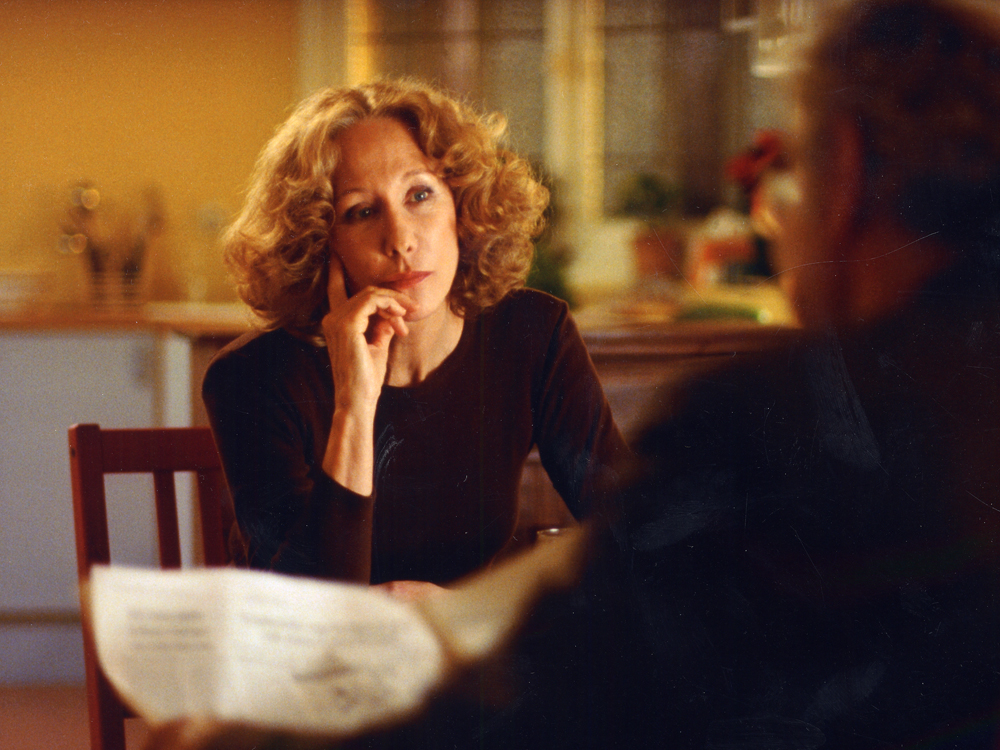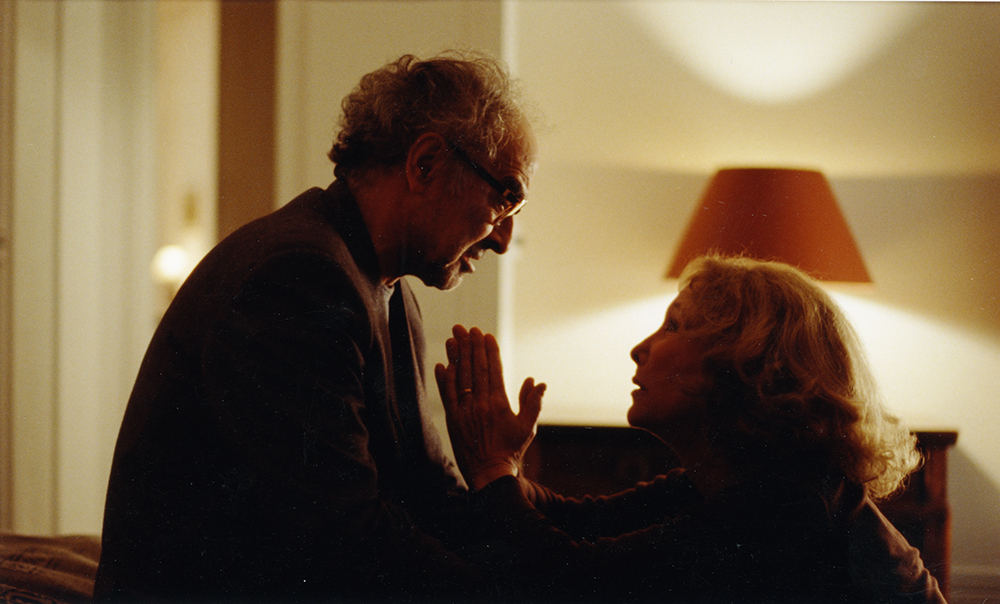
“Dear Anne-Marie Miéville,
Your film Après la réconciliation stunned and delighted me.
It has elements of both the whip and the tightrope.
It tells a story without telling a story. Without the usual ingredients of a story, I mean.
That a moral and philosophical reflection could be that cheerful, that is the film’s promise. We often laugh, but never at the cost of the characters, or the actors, who are all in their own way wonderfully light and committed.”
Jean-Claude Biette1
“Anne-Marie Miéville’s cinema has never hesitated over this: it talks about us. In the form of the I (Mon cher sujet), of the he or she (Lou n’a pas dit non) or really of ourselves, as in her last film, Nous sommes tous encore ici. She returns Après la réconciliation and the rediscovered peace is no more the peace of a couple in crisis than that of a country at war. It is peace of the human kind, which should indeed urgently be reconciled with itself, in the hope that it will finally look like itself somehow. [...] The garrulous quartet Anne-Marie Miéville has brought together also seems endowed with the ability to say anything (to each other). Not just that which hurts or harms, reassures or consoles, and the thousands of little things that make up the price and the pain of living together. But these people also talk about that which we don’t know how to talk about, about the nature of our relationship with the world and of our connection to others. About the permanence of a happiness at hand which just needs to be seized, pampered, cherished. About what we actually expect, in order to realize it and start changing things, as there is a unanimous agreement on the observation that things are in pretty bad shape. These chatterboxes have only one programme: of course, let’s talk about it. In the beginning was the Word, Miéville reminds us, adding that it will probably also be there at the end.
Olivier Séguret2
Olivier Séguret and Philippe Azoury: Is there an exorcist value to the pretty particular prologue of Après la réconciliation?
Anne-Marie Miéville: I don’t know how people will interpret this prologue, but it couldn’t be more explicit. It’s about children close to me. The idea came to me when I was finishing the editing.
Jean-Luc Godard: Sometimes people interpret too much. It is difficult to say anything else about this prologue besides: “You hear a voice, you see children and then you hear the same voice.” So you think: “This here is something from the past or from the origins of one of the characters.” It happens to be you, Anne-Marie. Another director with another history would have perhaps shown something of the character of Arthur the sailor. There’s nothing else to interpret. It’s enough to listen. Besides, the first word you hear is “to speak”. Which is after all the film’s énoncé. The average spectator or the distributor says that the beginning of the film is difficult. People prefer the big second part without realizing they would have never loved the second part without the small first part, the prologue.
Olivier Séguret and Philippe Azoury in conversation with Anne-Marie Miéville and Jean-Luc Godard3
“She is served the worst at her own table, her role – that of the woman who knew too much, the only one without a name — is the most functional of all, while Claude Perron is a sassy, dancing seductress, shining and transforming right before our eyes. As for the men, their bodies benefit even more from the mise-en-scène. Jacques Spiesser is motionless and thirsty, a traveller stranded in a Paris salon, perfectly content with silence and existence. Jean-Luc Godard, who taught us a long time ago that every fiction film is a documentary about its makers, is overwhelming with youth and exhaustion, with bad faith and lucidity about himself (“I’ve spoken too much.”) and about the men of his age and condition. The women who talk and move and the men who stay and insist invoke the ghosts of so many hopes abolished after wilder times. The despair passes, but in bitterness. Weeds grow in the cities.”
Jean-Michel Frodon4

« Chère Anne-Marie,
Votre film m’a stupéfait et ravi.
Il tient à la fois du fouet et de la corde raide.
Il raconte une histoire, sans en raconter une, je veux dire sans les ingrédients habituels d’une histoire.
Qu’une réflexion morale et philosophique soit aussi enjouée, voilà la promesse. On rit beaucoup, mais jamais au détriment des personnages, ni des acteurs, qui sont tous, chacun dans leur registre, merveilleux de légèreté et d’implication »
Jean-Claude Biette5
« Le cinéma d’Anne-Marie Miéville n’a jamais hésité sur ce point : il parle de nous. Sous la forme du je (Mon cher sujet), du il ou elle (Lou n’a pas dit non) ou vraiment de nous-mêmes, comme avec son précédent film, Nous sommes tous encore ici. Elle revient Après la réconciliation, et cette paix retrouvée n’est pas plus celle d’un couple en crise que celle d’un pays en guerre. C’est celle du genre humain, qu’il est en effet urgent de réconcilier avec lui-même, en espérant qu’il se ressemble enfin un peu. [...] Car le quatuor volubile réuni par Anne-Marie Miéville semble, en outre, doué de la faculté de pouvoir tout (se) dire. Non seulement ce qui fait mal ou ce qui nuit, ce qui rassure ou ce qui console, et ces mille petits riens qui font le prix et la douleur de vivre ensemble. Mais ces gens parlent aussi de ce dont on ne sait pas parler, de la nature de notre rapport au monde etde notre lien aux autres. De la permanence d’un bonheur sous notre main qui ne demande qu’à être saisi, choyé, chéri. De ce qu’on attend, au fait, pour s’en apercevoir et commencer à changer les choses puisque, sur le constat qu’elles sont en piteux état, ces choses, l’accord est unanime. Et ces bavards n’ont qu’un programme : évidemment, parlons-en. Au commencement était le Verbe, nous rappelle Miéville, qui ajoute que probablement, à la fin, aussi, il sera. »
Olivier Séguret6
Olivier Séguret et Philippe Azoury : Le prologue très particulier d’Après la réconciliation a-t-il une valeur d’exorcisme ?
Anne-Marie Miéville : Je ne sais comment les gens interpréteront ce prologue, mais il ne pouvait pas être plus explicite. Il concerne des enfants qui me sont proches. L’idée m’en est venue à la fin du montage.
Jean-Luc Godard : Les gens parfois interprètent trop. C’est difficile de dire de ce prologue autre chose que : « On entend une voix, on voit des enfants et ensuite on entend la même voix. » Donc on se dit : « Tiens, voici quelque chose du passé ou des origines de l’un des personnages. » Là, il se trouve que c’est toi, Anne-Marie. Un autre metteur en scène avec une autre histoire aurait peut-être fait passer quelque chose du personnage d’Arthur le navigateur. Il n’y a rien d’autre à interpréter. Il suffit d’écouter. D’ailleurs, le premier mot qu’on entend, c’est « parler ». C’est quand même l’énoncé du film. Le spectateur moyen ou le distributeur disent que le début du film est difficile. Les gens aiment mieux la seconde partie, la grande, sans voir que s’il n’y avait pas la petite, le prologue, ils n’aimeraient pas la grande de la même manière.
Olivier Séguret et Philippe Azoury en conversation avec Anne-Marie Miéville et Jean-Luc Godard7
« À sa propre table elle est la moins bien servie, son rôle – celui de la femme qui en savait trop, le seul qui n’ait pas de nom – est le plus fonctionnel, quand Claude Perron, dansante, séductrice, mutine, rayonne et se transforme à vue. Les hommes, le corps des hommes bénéficie plus encore de sa mise en scène. Immobile et assoiffé, Jacques Spiesser, le voyageur naufragé dans un salon parisien, est adorable de silence et d’existence. Jean-Luc Godard, qui nous a appris il y a bien longtemps que tout film de fiction est un documentaire sur ses interprètes, est bouleversant d’enfance et d’épuisement, de mauvaise foi et de lucidité, sur lui (« j’ai trop parlé... ») comme sur les hommes de son âge et de sa condition. Celles qui parlent et bougent, ceux qui restent et insistent invoquent les fantômes de tant d’es- poirs abolis depuis les temps chimériques. Le désespoir passe, mais point d’amertume. L’herbe pousse dans les villes. »
Jean-Michel Frodon8
- 1Jean-Claude Biette, originally published in 24 Images, nr. 109, winter 2002. Translated by Sis Matthé, as published in Pas de deux. The Cinema of Anne-Marie Miéville, compiled, edited and published by Sabzian, Courtisane and CINEMATEK.
- 2Olivier Séguret, “Life in Four Voices,” originally published in Libération, 27 December 2000. Translated by Sis Matthé, as published in Pas de deux. The Cinema of Anne-Marie Miéville, compiled, edited and published by Sabzian, Courtisane and CINEMATEK.
- 3Olivier Séguret and Philippe Azoury, ““Jean-Luc insisted on acting”. Interview by Olivier Séguret and Philippe Azoury,” originally published in Libération, 27 December 2000. Translated by Sis Matthé, as published in Pas de deux. The Cinema of Anne-Marie Miéville, compiled, edited and published by Sabzian, Courtisane and CINEMATEK.
- 4Jean-Michel Frodon, “Quartet for a Morning After Smile,” originally published as “Quatuor pour un sourire du lendemain” in Le Monde, 27 December 2000. Translated by Sis Matthé, as published in Pas de deux. The Cinema of Anne-Marie Miéville, compiled, edited and published by Sabzian, Courtisane and CINEMATEK.
- 5Jean-Claude Biette. Cette lettre est paru dans 24 Images, Numéro 109, hiver 2002. Ce texte est également inclus dans Pas de deux. Le cinéma de Anne-Marie Miéville, compilé, édité et publié par Sabzian, Courtisane et CINEMATEK.
- 6Olivier Séguret, « La vie à quatre voix, » Libération, 27 décembre 2000. Ce texte est également inclus dans Pas de deux. Le cinéma de Anne-Marie Miéville, compilé, édité et publié par Sabzian, Courtisane et CINEMATEK.
- 7Olivier Séguret et Philippe Azoury, « « Jean-Luc a insisté pour jouer » Propos recueillis par Olivier Séguret et Philippe Azoury, » Libération, 27 décembre 2000. Ce texte est également inclus dans Pas de deux. Le cinéma de Anne-Marie Miéville, compilé, édité et publié par Sabzian, Courtisane et CINEMATEK.
- 8Jean-Michel Frodon, « Quatuor pour un sourire du lendemain, » Le Monde, 27 décembre 2000. Ce texte est également inclus dans Pas de deux. Le cinéma de Anne-Marie Miéville, compilé, édité et publié par Sabzian, Courtisane et CINEMATEK.

